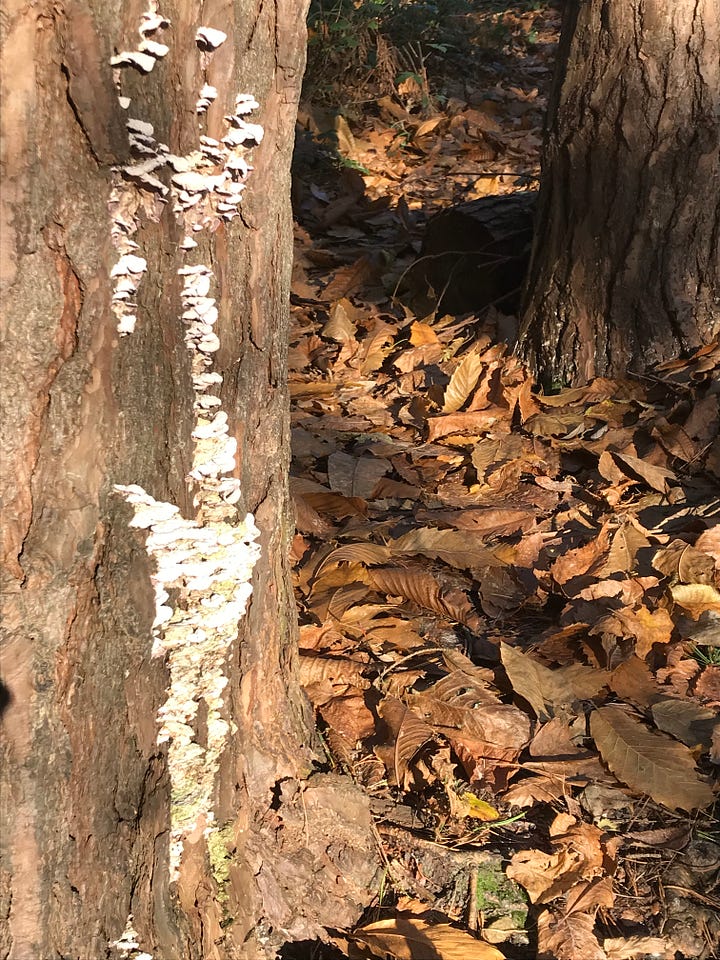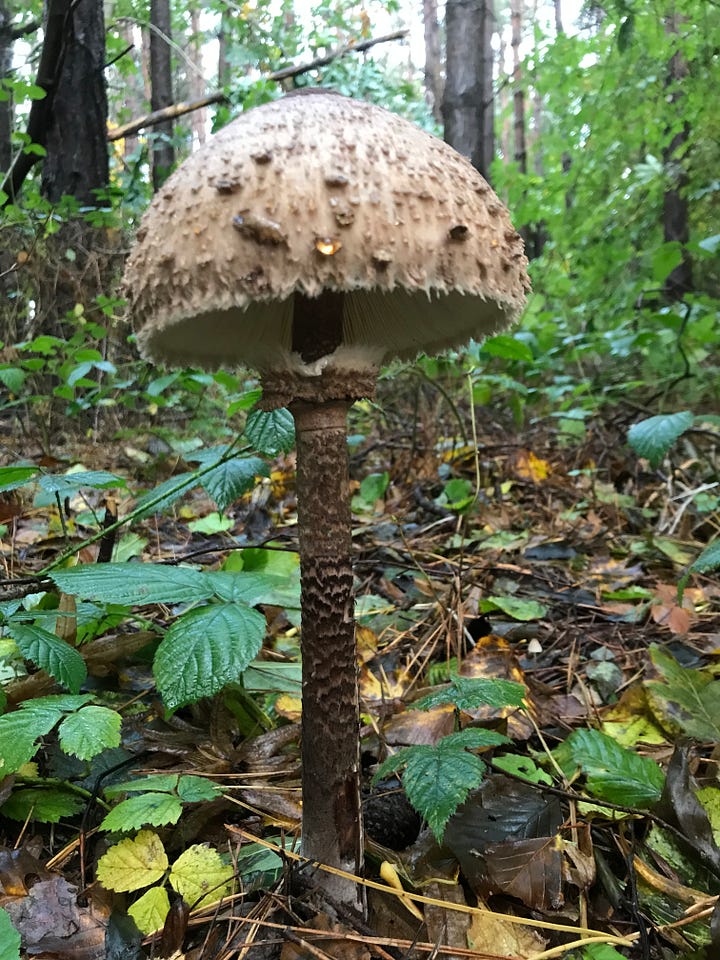Fungi solstice
celebrating darkness & all of life below the surface
Winter solstice, and the shortest day is again upon us, another year almost ended. I feel more welcoming of the darkness this year, content to spend some quiet time for reflection. This is so often the opposite to popular representation and expectations of the end of December. I have settled into my slow life of solitude.
After a relatively dry spell in the weather, it is raining again outside, inviting blanket forts and hot tea, fire lit. As leaf litter and bracken continue to decompose in the woods, nutrients returning to the soil, signs of life continue to show themselves. Colonies of fungi evidence the wide sprawling networks of root systems, the mycorrhizal networks signalling across the forest floor.




It reminds me of all the life that continues unseen, quietly, persistently ongoing, just beneath the surface. The darkness is the space for stillness and solitude, a place for gathering and composting. I first encountered connections between fungi and disability communities from Abi Palmer, likening those beneath the surface networks of communication with those we have with one another when living with chronic illness and disability - the necessity of this and its contribution to survival for many of us living in marginalised communities.
In the Wellcome Collection edited book, This Book is a Plant: How to Grow, Learn and Radically Engage with the Natural World, Abi Palmer writes, in her essay ‘Self-Portrait as a Mushroom in the Damp and Leafy Forest’:
“I have developed such an affinity with the fungal kingdom and its fruiting bodies. To be chronically ill, to be one of the sick ones - a postscript in the wake of a global pandemic - is to live like fungus. No matter how dignified you appear, or how majestic, there is something of a stench of death about you. There’s an association with breakdown and decay.
Like a mushroom, I appear strong and vibrant, but I’m very easily pulled apart. I have infirm, permeable edges and a lumpy alien shape. I too am spongy and malleable. I too bruise easily. I too spend a lot of time in the dark…
…I have taken to recording long and intense voice messages, back and forth, with other chronically ill friends, whom I cannot touch and have never seen. Like me, they lie in their own little darkened rooms, like me, unwashed, like me, in various states of undress. We have sore throats and sore hands. There are months of silence followed by unbelievable bursts of productivity, where life happens all at once. We all have extraordinary talents and strange hobbies and horrible doctors and far too many financial woes…
the conversations operate on Mushroom Time…” (p21-23)
Last year I wrote about celebrating the light. This year I am feeling more of a pull to the darkness. I am feeling differently to being in the dark, celebrating not the light but all the dark times and dark places I have inhabited over the years. It feels like a greater sense of respect for these places, rather than a previous pull to simply skip over them. I am so grateful for all the people I’ve met and are now friends, because of this enduring time of illness, all those I’ve learned from and with, in how to inhabit these places that might feel dark for multiple reasons.
Returning to Susan Sontag’s book, Illness As Metaphor, and the two Kingdoms she identifies, the Kingdom of the Sick and the Kingdom of the Well, I know my life is richer for my time in the former. The thoughtfulness and complexities of lives and networks, the things I have endured and lived through and with, are not things I would have chosen, but they have been nonetheless and cannot ‘unbe’. I have learned deeply and widely in these places. Some of these things have needed to be learned repeatedly, frustratingly, with each cycle of illness.
Merlin Sheldrake has also written about his relationship to fungi in Entangled Life: How Fungi Make Our Worlds. In his essay ‘Before Roots’, in the same book as Abi’s essay, he writes:
…”amid the slow burning disputes that surround the early history of life, one piece of academic consensus stands out: it was only by striking up new relationships with fungi that algae were able to make it onto land.
These early alliances evolved into what we now call mycorrhizal relationships. Today, more than 90 per cent of all plant species depend on mycorrhizal fungi…Out of this intimate partnership - complete with co-operation, conflict and competition - plants and mycorrhizal fungi enact a collective flourishing that underpins our past, present and future.” (p10-11)
From today the light will grow, slowly but surely. For those unused to inhabiting the darkness, I hope you can find something to take from these short days and long nights, they do not last.
As a final thought, from the first piece in This Book is a Plant, Eduardo Navarro and Michael Marder invite the reader into a performative engagement with the world around you:
“Take a moment to draw a cosmic breath with your whole body, slower than any breath you have ever taken in your life.
Close your eyes. See and hear with your skin as you embody the density that emanates from within the seed of your thoughts. Register the vibrations rippling throughout the space around you and the radiant waves enveloping you. Caress the air with your hands, petting its flows with each fingertip. Feel how grounded, yet free, you are. Stable, but supple.
Your skin is more than skin. It is at the same time an enormous leaf, in which your whole body is wrapped, as well as a respiratory system and a number of sense organs, photosensitive and acoustically engaged…” (p3)
As an end of year gift I have unlocked all of my previous posts from this year. I will leave them free to read/listen to until the end of the year.
Have a great weekend!
Moving Mountains: Writing Nature Through Illness and Disability is now available in hardback and as an ebook, and is available to preorder in paperback (available from 6th March 2025)



Thank you for this, I so appreciate your attentiveness to the darkness. I’m grateful to live in a place where we can be in a prolonged time of darkness. The darkness is regenerative, a time to tend to deeper roots and silences. I enjoy the feasting and gathering with friends and family for the holidays, and the minute they’re over, a quiet January with plenty of night, with twilit mornings and late afternoons, are so welcome.
Thank you for these thoughts. I absolutely love the Abi Palmer quote. I also love fungi - sadly the fruiting bodies are mostly gone now where I live. Happy dark days to you!